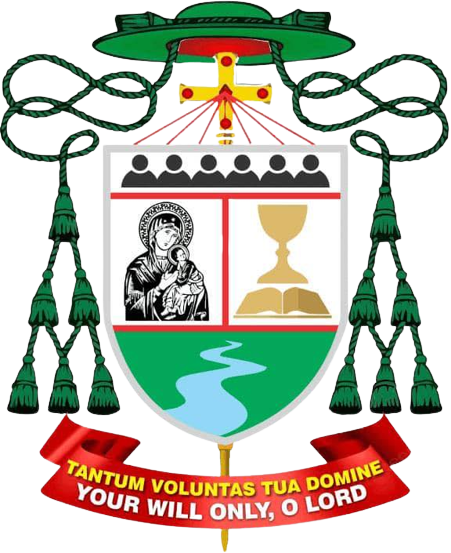At the end of their meeting held at the St John Paul II Pastoral Centre, Makurdi from the 25th to the 29th of March, 2019, the National Association of Diocesan and Religious Directors of Communications, the following resolutions were made;
Preamble:
We, members of the National Association of Diocesan and Religious Directors of Communications converged at the St. Pope John Paul II Pastoral Centre Makurdi from the 25th to the 29th of March, 2019 for our First Plenary during which we reflected on the Pope’s Message for the 53rd World Communications Day on the theme: ‘We are members one of another ( Eph.4:25), from Social Network Communities to Human Communities’.
Gratitude:
We are grateful to God for his blessings on the Nigerian Church. We received the news of the appointment of Most Rev. Ignatius Ayau Kaigama as the Coadjutor Archbishop of Abuja with gratitude as well as the appointment of Monsignor Francis Adesina as the Bishop of Ijebu-Ode Diocese and the appointment of Msgr Patrick Eluke as the Auxiliary bishop of Port Harcourt. We are happy with the centenary anniversary celebration of the arrival of the Catholic Faith in Kano. We are equally grateful for the elevation of one of ours, Fr. Chris Anyamwu, to the position of the Deputy Secretary General at the Catholic Secretariat of Nigeria. We appreciate the fatherly presence and direction of Most Rev. Denis Chidi Isizoh, CBCN Chairman on Communication.
On the state of the Nation:
We are grateful to God for keeping us as one united nation after the 2019 elections. We call on all who have come out victoriously after the elections to be magnanimous in victory – embrace their competitors from the other political divides and together fashion out policies that will contribute to the growth of our nation. We equally call on those who have lost this time to exhibit the spirit of sportsmanship and join hands with the government to work for the good of our nation.
Our contribution to the communication apostolate:
In conjunction with the Centre for the Study of African Culture and Communication (SESACC) of the Catholic Institute of West Africa, Port Harcourt, we have produced a professional Code of Ethics for Catholic Journalists and Media Practitioners in Nigeria. The Code of Ethics will serve as a guideline for both professional and freelance Catholic journalists and media practitioners who are working in diocesan or congregational media organisations. This Code of ethics will also serve journalists and media practitioners who are working in privately owned catholic media organisations and those who work in public or secular media organisations.
Our concerns
1. Harm Caused by improper use of the new social media: During the one week of paper presentations and workshops, we have noticed with great concern the harm being caused by the improper use of the social means of communication. Even though the new means of social communications, when well employed, are veritable tools for evangelization and human development, their wrong use has the potential to destroy human interaction.
The positive side of the use of the new social means of communication include the ease of communication, improvement in learning and education, simplification of things, creation of artificial intelligence that can ease our work and the generation of big data, its flip side can be damaging such as the promotion of insensitivity, loss of empathy, promotion of false living, insecurity, loneliness, distractions, addiction, hatred, misinformation, disinformation, fake news and information pollution. The replacement of interpersonal communication with the social media has made the prophesy of Albert Einstein with its negative repercussion true: ‘I fear the day that technology will surpass our human interaction. The world will have a generation of idiots.’
2. The drifting of our catholic youth to new generation churches in droves. Our catholic youth are drifting to the new generation churches in droves. One of the reasons identified is that some of these churches employ the use of the new social means of communication and brand their churches and messages in ways that are attractive to the young generation.
3. Poor funding of the communication apostolate. Even though the church is all about the communication of the good news, there has been poor funding of communication activities in our churches as compared with other agents of evangelization such as schools and hospitals.
4. The Spate of Kidnap and Killing of priests/Religious: We have noticed with shock and disdain the increasing rate of kidnaps and sometimes, murder of priests and religious in our country. The church has been, and continues to be the voice and hope of the voiceless in our society, this function has been carried out by priests and religious, doing away with priests and religious implies doing away with the church and what it stands for.
Our recommendations:
1. Pastoral agents should be properly trained in the use of the new media. Communication courses should be introduced in our minor and major seminaries as well as houses of formation for our religious. This is in line with the recommendation of Inter Mirifica: ‘Since the proper use of the media of social communications which are available to audiences of different cultural backgrounds and ages, calls for instruction proper to their needs, programs which are suitable for the purpose-especially where they are designed for young people-should be encouraged, increased in numbers and organized according to Christian moral principles. This should be done in Catholic schools at every level, in seminaries and in lay apostolate groups’.
2. Workshops should be organized for our youth aimed at giving them orientation on the proper use of the social media; and creating social media platforms that will help to strengthen the faith of our youth.
3. The church should establish online presence and maintain it.
4. Our institutions: educational, health and pastoral, should be standardized to make them compatible with modern trends and then efficient and professional staff be employed to run them.
5. The church should partner with Non-Governmental Organisations as well as government parastatals in her efforts to provide quality service to the people.
6. The church should avail herself of the new media to market her faith, disseminate what it is doing in her various sectors – in justice and peace and integrity of creation, education, health, spirituality- especially healing that come through encounter with Jesus in the Blessed Sacrament, etc.
7. Communication should be made part and parcel of every pastoral plan. We have resolved to adopt and make our own the words of the Pastoral Instruction, Aetatis Novae that ‘Catholic media work is not simply one of more programme alongside all the rest of the church’s activities; social communications have a role to play in every aspect of the Church’s mission. Thus not only should there be a pastoral plan for communication, but communication should be an integral part of every pastoral plan, for it has something to contribute to every other apostolate, ministry and programme’. (Aetatis Novae, no. 17).
8. We appeal to the Catholic Bishops’ Conference of Nigeria to undertake a research on the causes of the kidnap and murder of the priests/religious and collaborate with the government in bringing to an end this sacrilegious act.
Appreciation and Conclusion:
We are grateful to the Catholic Diocese of Makurdi for the sense of hospitality shown to us during our days in Makurdi, the capital city of Benue State. We appreciate the efforts of the Abuja province for hosting us. We are thankful to the Catholic Bishops’ Conference of Nigeria for giving the communication apostolate a pride of place. We pray for their continuous support for this apostolate as we continue to explore ways that can help us reach and evangelise the modern man where he is. We ask for the maternal intercession of Mary, Our Blessed Mother, and we pray that she who formed Jesus in her human image, may form us in your divine image, by the power of the spirit, to the glory of God the Father.
Signed:
Sr Josephine ODORWIKE, EHJ Rev. Fr. Ben ACHI
Vice President Secretary

